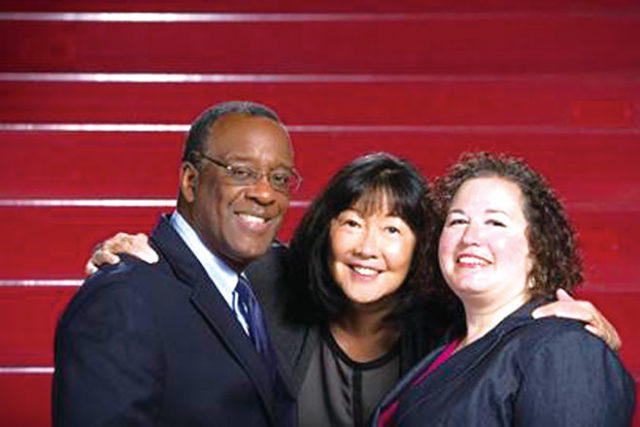
By Shihou Sasaki
The North American Post
Local-born Sansei Theresa Fujiwara remembers growing up near a local library. Like her bookworm mother, Fujiwara enjoyed going to the library every week, borrowing as many books as she could to read and learn new things.
“She is my role model,” said Fujiwara, who used to visit the Columbia Branch of the Seattle Public Library. “The Columbia Branch was my second home.”
The library is not just for books but is also a gathering place. The Nikkei said that each library needs to mirror the needs of the neighborhood community, which may need computer services for seniors, story times for children or even services for people new to business or this region.
“Immigrant and refugee parents can come into the library and see people just like them – there are no divisions of people, or income – it is the most democratic of places,” she said. “You don’t have to meet anyone else’s agenda. The Library is always there to help you navigate and help get you what you need.”
Fujiwara is currently serving in her second year as the president of the Seattle Public Library board of trustees. She is campaigning this month to raise library membership. It’s Library Card Sign-up Month and she’s running a program called “With My Library Card I Can” that promotes the library’s freely offered membership with new and innovative services.
The campaign last year successfully brought in 10,000 new cardholders to make for a total of over 375,000 members. Fujiwara said she is not yet satisfied with that number.
“I want everyone to hold a library card,” she said.
Fujiwara has been a board member of the library since 2010 and said that “it’s been a real joy to work there,” trying to support and partner with local communities as well. Using its public spaces, the library had an opportunity to hold a performance by the Seattle Symphony and even a public viewing of the Seattle Seahawks game.
Fujiwara also has a vision for a new project. She said that she wants to create a library collection for all ethnic communities through supporting local institutions including the Japanese Cultural & Community Center of Washington in order “to capture the history and educate people through easy access.” Featuring more local writers from the minority communities including Ken Mochizuki, the author of the famous “Baseball Saved Us” would help “keep the community being proud of the authors in some way.”
The library board president said that the books that have been most important and influential to her are rooted in ethnic studies and social justice, such as “A Testament of Hope: The Writings and Speeches of Dr. Martin Luther King Jr.,” and “America is in the Heart,” by Carlos Bulosan.
She helped establish Seattle’s Asian Counseling and Referral Services early in her career, and worked with immigrant and refugee communities for the Annie E. Casey Foundation. After serving under mayors Norm Rice and Paul Schell, she is currently associate vice president for community services at United Way of King County.
“If you are a community organizer, you are always thinking of the logistics of getting people together and organizing,” she said. “What I witnessed in my work was that libraries were these natural gathering places – they provided a sense of belonging and an opportunity for groups to come together and network and have a collective voice.”
More information about services of the Seattle Public Library can be found at (206) 386-4636 or www.spl.org.



